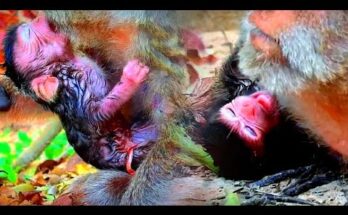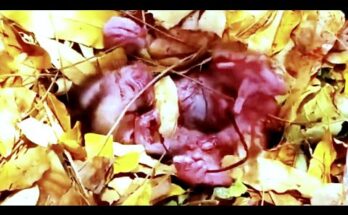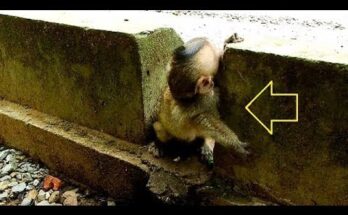
In the untamed heart of the jungle, where survival often trumps sentiment, a quiet drama unfolds—one as ancient as nature itself. A baby monkey, barely old enough to balance on his trembling limbs, reaches desperately for his mother’s chest, searching for the warmth and milk he’s always known. His cries—soft at first, then piercing—echo through the trees. But his mother… doesn’t respond.
She turns away.
Not with violence. Not with malice. But with a calm, unwavering firmness that cuts deeper than any blow.
To the untrained eye, this might appear cruel. How could a mother—his only source of life and love—deny him comfort in such a vulnerable moment? But nature writes her rules in the language of necessity. And this, here in the dense jungle beneath the shifting canopy of green, is not cruelty—it is survival.
🐒 A Baby’s Tears, A Mother’s Silence
The infant clings, sobbing. His eyes, wide with confusion, seem to beg: What did I do wrong? He presses his tiny body against hers, reaching for the milk that once flowed so freely. But she pushes him back—gently, but consistently. She swats him aside. She walks forward without a glance. Each rejection is a quiet blow to his fragile heart.
And yet—she knows he follows. She hears each of his stifled cries, senses every shaky step behind her. She’s not abandoning him. She’s leading him into something harder, something more essential: independence.
🌿 Discipline in the Wild
In the jungle, tenderness is a luxury. Every choice a mother makes is shaped by unseen threats—scarce food, looming predators, unstable troop dynamics. Some infants perish not from predators, but from weakness, dependency, or lack of adaptability. The harsh truth? The jungle does not coddle. And neither, always, do its mothers.
This strict maternal behavior isn’t uncommon among primates, particularly in times of environmental stress. Some mothers wean early, enforce distance, or refuse to respond to every whimper—not from lack of affection, but from an evolved instinct to raise stronger, more capable young. It’s a painful calculation, made silently, again and again across the generations.
She might have lost previous offspring. Or she may sense that her baby, so emotionally clingy and physically unsteady, needs to be hardened quickly. Every swat, every denied suckle, is not rejection—it’s training.
💔 A Baby’s Breaking Point
Still, none of this softens the emotional blow to the little one. He doesn’t understand survival or strategy. He only knows that the arms that once cradled him are now firm and closed. That the soothing lullaby of his mother’s heartbeat has become distant. His cries turn to hiccups. His tiny body slumps as exhaustion and confusion consume him.
Yet she watches. From a distance. Silently alert. She is never far.
🌱 The Slow Bloom of Growth
By late afternoon, something begins to change. The baby’s crying lessens. Not from defeat, but from learning. He picks up a twig. He nibbles on a leaf. He watches an ant crawl across a root. His world, once defined only by his mother’s warmth, slowly expands.
He tries again to nurse—but this time, hesitates. He sits beside her instead, leaning into her fur but not demanding. She lets him rest there. She does not pull away.
This is the quiet magic of tough love in the wild: growth doesn’t come with a kiss. It comes with a hard lesson, with resilience forged through temporary discomfort. Through denial, not abandonment. Through discipline, not disinterest.
🧠 The Psychology of a Wild Mother
Researchers have observed similar behaviors in macaques, baboons, and even great apes. First-time mothers often struggle, while experienced ones balance affection with assertion. The moment a baby learns to forage, to move independently, to calm itself—that’s the moment the mother has succeeded. And often, that success is born through resistance, not rescue.
Mother monkeys are not devoid of love. Their love is just… fierce. Fierce in a way that sometimes looks harsh, because it’s not built for comfort—it’s built for continuity. For survival. For the cruel but necessary truth that one day, that baby will face the jungle alone.
❤️ Love Wears Many Faces
In the human world, we value nurture, softness, and open arms. But in the world of wild primates, love often wears a sterner face. It withholds. It denies. It waits in the shadows as the child stumbles and cries—because that stumble might one day be the difference between life and death.
So next time you see a mother monkey swat her crying baby or walk away from a desperate plea for milk, look deeper. You might not be witnessing rejection. You might be witnessing a powerful, unspoken lesson in courage.
A mother’s love isn’t always kind.
But it is, always, devoted.


